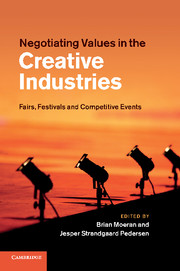Book contents
- Frontmatter
- Contents
- Figures
- Tables
- Contributors
- Acknowledgements
- Introduction
- 1 A Salon’s life
- 2 Art fairs
- 3 Biennalization and its discontents
- 4 Staging auctions
- 5 The book fair as a tournament of values
- 6 Inventing universal television
- 7 Transforming film product identities
- 8 Event institutionalization and maintenance
- 9 Tradition and transformation at the Fan Fair festival
- 10 Between art and commerce
- 11 Configuring sustainability at fashion week
- 12 An inconvenient truce
- 13 The retrospective use of tournament rituals in field configuration
- Afterword Converting values into other values
- Author index
- Subject index
- References
13 - The retrospective use of tournament rituals in field configuration
the case of the 1976 ‘Judgement of Paris’ wine tasting
Published online by Cambridge University Press: 25 October 2011
- Frontmatter
- Contents
- Figures
- Tables
- Contributors
- Acknowledgements
- Introduction
- 1 A Salon’s life
- 2 Art fairs
- 3 Biennalization and its discontents
- 4 Staging auctions
- 5 The book fair as a tournament of values
- 6 Inventing universal television
- 7 Transforming film product identities
- 8 Event institutionalization and maintenance
- 9 Tradition and transformation at the Fan Fair festival
- 10 Between art and commerce
- 11 Configuring sustainability at fashion week
- 12 An inconvenient truce
- 13 The retrospective use of tournament rituals in field configuration
- Afterword Converting values into other values
- Author index
- Subject index
- References
Summary
In 1976 Paris-based British wine merchant Steven Spurrier organized a wine-tasting event at which French wines were pitted against American ones. The American wines were the surprising winners in the tournament, beating some of the most vaunted French wines. Although this ritual garnered little attention at the time, in intervening years its significance has grown progressively, particularly as the elite dominance of French wines has decreased. For those advocating for the liberating force of globalization in the wine industry, the ‘Judgement of Paris’ tournament ritual serves as a convenient marker of the shift in the balance of power from the Old World to the New World and from English wine critics to the American Robert Parker. The ‘Judgement of Paris’ shows how tournament rituals are co-opted retrospectively by forces seeking to reconfigure fields. Using theories of collective memory and social remembering, I show how vested social actors seeking to reconfigure fields co-opt tournament rituals retrospectively. The instance of retrospective utility stands in stark contrast to prospective models of tournament rituals, where institutional entrepreneurs try to shape the unfolding of a field. Thus, ephemeral tournaments that might otherwise have been forgotten have retrospective utility, especially for those shaping the collective memory of the field in order to suit future interests.
Tournament rituals as field-configuration mechanisms
Appadurai (1986: 21) defines tournaments of value as ‘complex periodic events that are removed in some culturally well-defined way from the routines of economic life. Participation in them is likely to be both a privilege of those in power and an instrument of status contests among them’. Tournament rituals, a concept derived from this definition, are ceremonial spectacles enacted with periodic regularity in organizational fields and set apart from humdrum everyday routines (Anand and Watson, 2004). Examples of tournament rituals include awards ceremonies such as the Grammy Awards and the Booker Prize.
Information
- Type
- Chapter
- Information
- Negotiating Values in the Creative IndustriesFairs, Festivals and Competitive Events, pp. 321 - 333Publisher: Cambridge University PressPrint publication year: 2011
References
Accessibility standard: Unknown
Why this information is here
This section outlines the accessibility features of this content - including support for screen readers, full keyboard navigation and high-contrast display options. This may not be relevant for you.Accessibility Information
- 2
- Cited by
